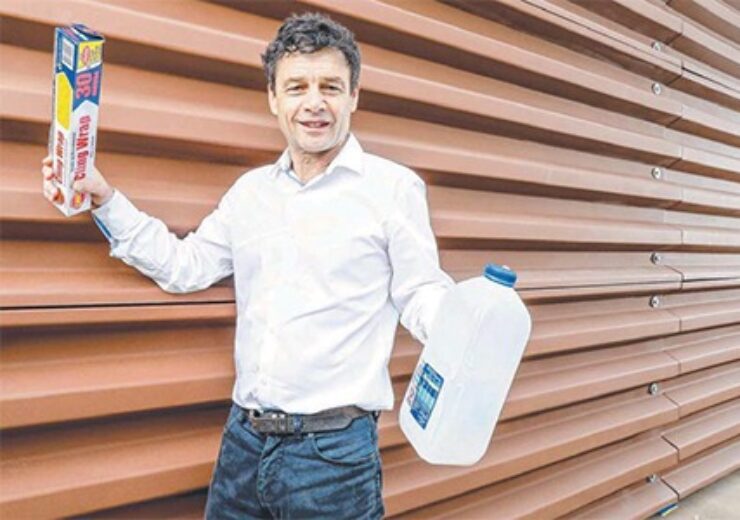Breakthrough technology using 75% recycled materials including milk bottles and soft plastics will help build Australia’s circular economy and demonstrate the opportunity for locally recycled materials

Pact Group transforms 600 tonnes of plastic waste into recycled noise wall solution for Mordialloc Freeway. (Credit: Pact Group)
Victoria is set to house Australia’s most sustainable noise walls thanks to innovative technology by Pact Group. Situated along Mordialloc Freeway, the walls will transform 570 tonnes of hard-to-recycle plastic materials into panels spanning 32,000 square metres.
The initiative was developed by Major Roads Projects Victoria (MRPV) with assistance from Ecologiq, a Victorian Government initiative to optimise the use of recycled and reused materials across Victoria’s Big Build projects and will be installed by AusGroup Alliance. Construction of the wall, which is a world-first, commenced in December 2020 with completion anticipated by October 2021.
The freeway will span a nine-kilometre stretch connecting the Mornington Peninsula Freeway to the Dingley Bypass. Each panel will be produced from 75 per cent recycled materials, including soft plastics and hard to recycle post consumer low- and high-density polyethylene (HDPE), providing a second life for single use plastics like milk bottles. At the end of their 40-year lifespan, each panel will be 100 per cent recyclable demonstrating the significant opportunity for the current and future circular economy.
Pact Group Managing Director and CEO Sanjay Dayal called the new technology and installation of the noise wall an inspiring innovation for Australia’s circular economy with the potential to unlock opportunities both locally and internationally.
“This project is a breakthrough for how we use materials like soft plastics which have traditionally been one of the hardest materials to recycle. What we’re most proud of is how highly scalable this solution is. It’s something that could easily be adopted by infrastructure projects across the country, fuelling demand for recycled materials, diverting waste from landfill and helping to build our local manufacturing capacity and deliver new jobs in Australia’s circular economy. It also creates opportunities for other countries to adopt similar practices and improve recycling capabilities at a global level,” said Mr Dayal.
“The new technology is part of Pact Group’s long-term vision to build Australia’s circular economy by investing in initiatives which create demand and use-cases for locally recycled materials. As well as helping boost the Australian manufacturing industry and broader economy, innovations like this also help us to reduce the volume of plastic imported into Australia by capitalising on locally sourced recycled materials,” said Mr Dayal.
The Mordialloc Freeway noise walls represent a potential shift in the Victorian Government’s approach to noise wall composition, which has traditionally involved concrete or steel and signifies an increase in the use of recycled materials. Of the recycled materials used, half is from soft plastics while the other half is from HDPE.
The plastic-based composition of the panels offers long term benefits that far outweigh the use of steel or concrete including cost efficiencies. The panels are easy to install and are low maintenance, offering colour fast for 30 years where graffiti washes off while also acting as a fauna barrier to potentially stop animals crossing the road.
Using soft plastics and HDPE to build the wall will be a pilot offering that could result in major changes to upcoming infrastructure project material specifications and drive further use of locally sourced and recycled materials.
Ecologiq Director Tony Aloisio described the opportunity as an exciting step forward and believes post-consumer recycled plastics have great potential to be used in more Victorian transport projects.
“This is a crucial part of Ecologiq’s work to extract value out of our state’s waste streams and ensure that value is built back into our state’s circular economy,” Mr Aloisio said.
“We’re thrilled that government and industry have come together to maximise the use of recycled plastics, and we look forward to supporting similar initiatives in the future.”
Pact Group is considering several options to licence the manufacturing and subcontracting of the panels in other countries, putting Australian innovation on the global stage. This creates countless opportunities to help other countries in building their own circular economies.
Pact Group has made a series of aspirational targets as part of its 2025 End of Waste Strategy, including:
By 2025 Pact Group will eliminate all non-recyclable packaging that it produces.
By 2025 Pact Group will have solutions to reduce, reuse and recycle all single use secondary packaging in supermarkets.
By 2025 Pact Group will offer 30 per cent recycled content across its packaging portfolio.
Source: Company Press Release
